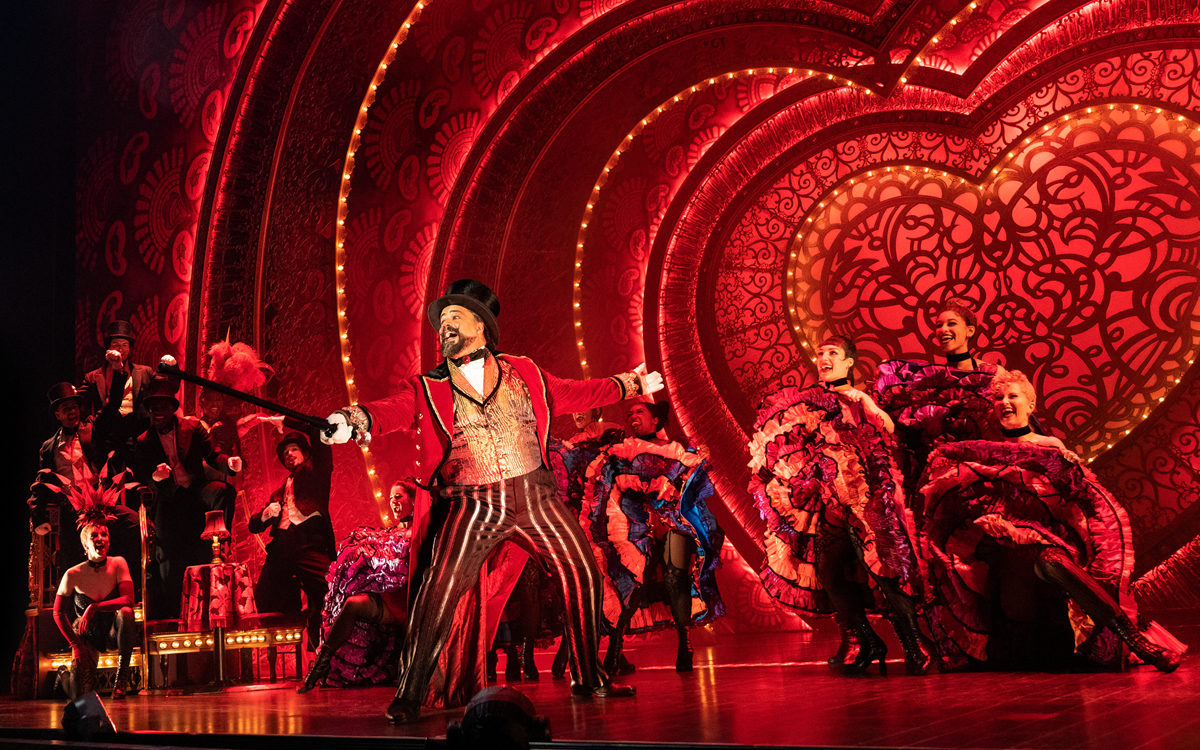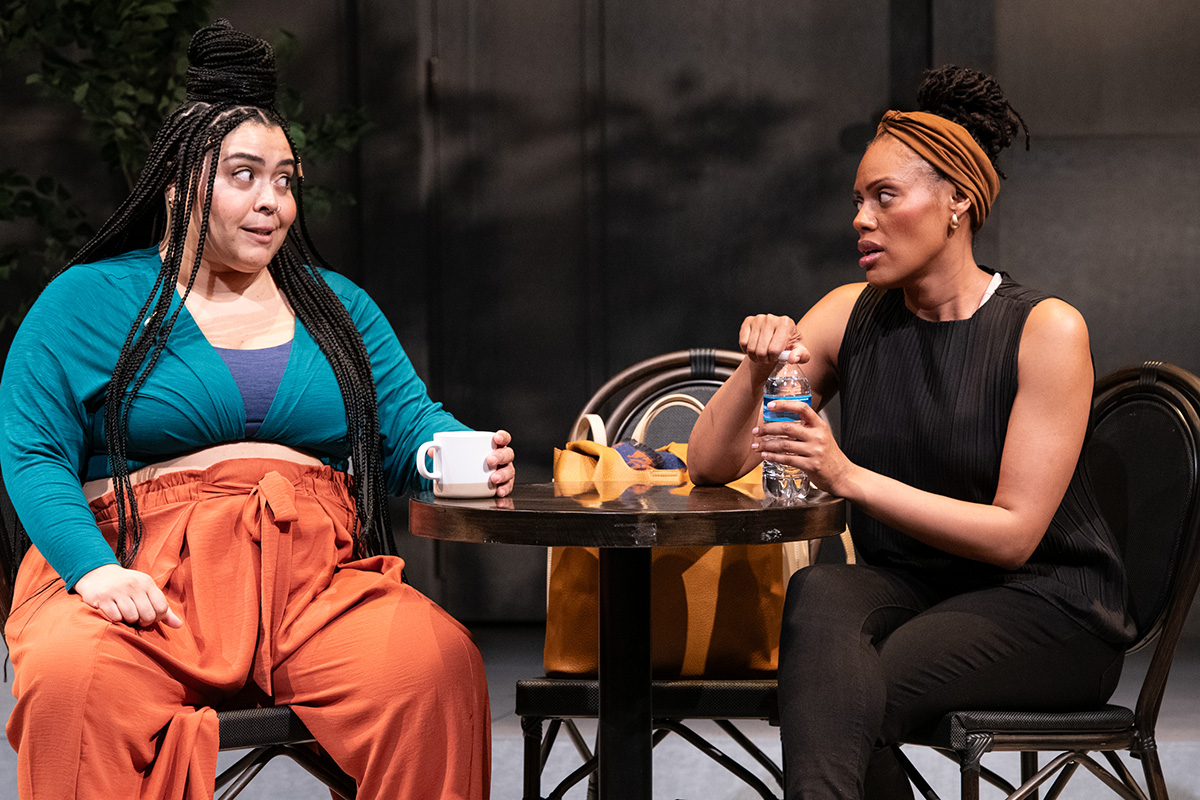Theater
There’s nothing subtle about ‘Moulin Rouge! The Musical’
Dazzling Kennedy Center production makes for exhilarating summer escape

‘Moulin Rouge! The Musical’
Through Sept. 24
The Kennedy Center Opera House
2700 F St., N.W.
$45 – $199
kennedy-center.org
There’s nothing subtle about “Moulin Rouge! The Musical.” The set, the score, the book, the Vegas meets fin de siècle costumes are all undeniably extra but that’s what makes it tick. Now at the Kennedy Center, the jukebox musical is plying its over-the-top charms on D.C.
At a recent matinee, having left the hot sun of the terrace for the cool confines of the Opera House, I felt transported. Always cavernous and ornate, the theater was now aglow in bright pinkish red, the stage an explosion of concentric hearts, book-ended by a huge red windmill and an enormous blue elephant, and backed by a tapestry filled with fleurs de lis and yet more windmills. Onstage, corseted dancers, female and male, lured the audience into their snare while a pair of sword swallowers provocatively displayed their skills before the foot lights.
It’s 1899 Paris and the Moulin Rouge nightclub is busy. A louche haven where titled men pick favorites from the demimonde, the popular boîte is helmed by emcee/impresario/owner Harold Zidler (the terrific Austin Durant). Artfully addressing his audience, he calls up to the balcony, “I want to make love to each and every one of you,” but his real focus is on the deep pocketed swells closer to the stage. The Moulin Rouge is going bust and without securing an investor STAT, Zidler can’t keep club going, Champagne flowing, and cute chorus boys knocking at his door.
Nearing rock concert volume, the show opens with four vivacious showgirls exploding into “Lady Marmalade” accompanied by an uber versatile, medium-sized pit orchestra. But then, the mood abruptly changes when Christian (Christian Douglas covering for out actor John Cardoza), an aspiring American songwriter, recounts his journey. He’s left the strictures of Lima, Ohio, for Paris’ freewheeling Montmartre quarter where he joins France’s children of the revolution in celebrating the bohemian principles of truth, beauty, freedom, and, primarily, love.
There he rapidly befriends Latin dancer/gigolo Santiago (Gabe Martínez) and the delightfully antiestablishment painter Toulouse-Lautrec played by Nick Rashad-Boroughs. The trio endeavor to produce a show and will somehow convince Moulin Rouge headliner Satine (Nicci Claspell covering for Yvette Gonzalez-Nacer) to play the lead. It’s a longshot, but why not?
Meanwhile Zidler has other plans for streetwise pal Satine involving the nefarious Duke of Monroth played by the handsome but insufficiently repellant Andrew Brewer. Monroth introduces himself to Satine with a mash up of “Sympathy for the Devil” and other Rolling Stones songs. Zidler suggest the rich nobleman might be the payday they both desperately need.
After a bungled introduction in which Satine mistakes Christian for the Duke, a passion ignites between the unlikely pair and a difficult relationship ensues. (Not incidentally, both Claspell and Douglas are glorious singers and able actors, neither of whom faltered on a line or lyric. Again, understudies save the day.)
Based on Baz Luhrmann’s innovative 2001 celluloid success “Moulin Rouge,” an ill-fated romance that put movie musicals back on the map for some time, the 2019 Broadway hit tells the same story, and also employs a mashup of mostly chart-topping tunes. Similar to the film, “Moulin Rouge! The Musical” rather brilliantly uses contemporary music (Madonna, Elton John, Lady Gaga, Whitney Houston, Katy Perry, Queen, Nat King Cole, and many more) to put across a turn of the 20th century Belle Epoque narrative; these anachronistic renditions are clever, sometimes dark, and always wonderfully unexpected.
Director Alex Timbers assembled a brilliant design team: set designer Derek McLane, costume designer Catherine Zuber, and quite significantly lighting designer Justin Townsend. Beyond the divine excess of the scarlet, glowing club, they create a world of Belle Epoque fantasy including a pastel-hued Champs-Élysées and an artsy silvery-skied Montmartre.
John Logan’s book borrows from various operas, romantic novels, and some classic movies including “Cabaret” and gay director George Cukor’s 1936 “Camille” starring Garbo as the courtesan and an arrestingly pretty Robert Taylor as the bogus baron who steals her heart.
Other contributions of note include Justin Levine’s music supervision, orchestrations, and arrangement, as well as Sonya Tayeh’s innovative, athletic choreography, especially an erotic number featuring Santiago (Martínez) and blonde cabaret siren Nini (scene stealer Libby Lloyd).
Diverting and visually dazzling, “Moulin Rouge! The Musical” makes for an exhilarating late summer escape.
Theater
Round House explores serious issues related to privilege
‘A Jumping-Off Point’ is absorbing, timely, and funny

‘A Jumping-Off Point’
Through May 5
Round House Theatre
4545 East-West Highway, Bethesda, Md.
$46-$83
Roundhousetheatre.org
In Inda Craig-Galván’s new play “A Jumping-Off Point,” protagonist Leslie Wallace, a rising Black dramatist, believes strongly in writing about what you know. Clearly, Craig-Galván, a real-life successful Black playwright and television writer, adheres to the same maxim. Whether further details from the play are drawn from her life, is up for speculation.
Absorbing, timely, and often funny, the current Round House Theatre offering explores some serious issues surrounding privilege and who gets to write about what. Nimbly staged and acted by a pitch perfect cast, the play moves swiftly across what feels like familiar territory without being the least bit predictable.
After a tense wait, Leslie (Nikkole Salter) learns she’s been hired to be showrunner and head writer for a new HBO MAX prestige series. What ought to be a heady time for the ambitious young woman quickly goes sour when a white man bearing accusations shows up at her door.
The uninvited visitor is Andrew (Danny Gavigan), a fellow student from Leslie’s graduate playwriting program. The pair were never friends. In fact, he pressed all of her buttons without even trying. She views him as a lazy, advantaged guy destined to fail up, and finds his choosing to dramatize the African American Mississippi Delta experience especially annoying.
Since grad school, Leslie has had a play successfully produced in New York and now she’s on the cusp of making it big in Los Angeles while Andrew is bagging groceries at Ralph’s. (In fact, we’ll discover that he’s a held a series of wide-ranging temporary jobs, picking up a lot of information from each, a habit that will serve him later on, but I digress.)
Their conversation is awkward as Andrew’s demeanor shifts back and forth from stiltedly polite to borderline threatening. Eventually, he makes his point: Andrew claims that Leslie’s current success is entirely built on her having plagiarized his script.
This increasingly uncomfortable set-to is interrupted by Leslie’s wisecracking best friend and roommate Miriam who has a knack for making things worse before making them better. Deliciously played by Cristina Pitter (whose program bio describes them as “a queer multi-spirit Afro-indigenous artist, abolitionist, and alchemist”), Miriam is the perfect third character in Craig-Galván’s deftly balanced three-hander.
Cast members’ performances are layered. Salter’s Leslie is all charm, practicality, and controlled ambition, and Gavigan’s Andrew is an organic amalgam of vulnerable, goofy, and menacing. He’s terrific.
The 90-minute dramedy isn’t without some improbable narrative turns, but fortunately they lead to some interesting places where provoking questions are representation, entitlement, what constitutes plagiarism, etc. It’s all discussion-worthy topics, here pleasingly tempered with humor.
New York-based director Jade King Carroll skillfully helms the production. Scenes transition smoothly in large part due to a top-notch design team. Scenic designer Meghan Raham’s revolving set seamlessly goes from Leslie’s attractive apartment to smart cafes to an HBO writers’ room with the requisite long table and essential white board. Adding to the graceful storytelling are sound and lighting design by Michael Keck and Amith Chandrashaker, respectively.
The passage of time and circumstances are perceptively reflected in costume designer Moyenda Kulemeka’s sartorial choices: heels rise higher, baseball caps are doffed and jackets donned.
“A Jumping-Off Point” is the centerpiece of the third National Capital New Play Festival, an annual event celebrating new work by some of the country’s leading playwrights and newer voices.
Theater
‘Amm(i)gone’ explores family, queerness, and faith
A ‘fully autobiographical’ work from out artist Adil Mansoor

‘Amm(i)gone’
Thorough May 12
Woolly Mammoth Theatre
641 D St., N.W.
$60-$70
Woollymammoth.net
“Fully and utterly autobiographical.” That’s how Adil Mansoor describes “Amm(i)gone,” his one-man work currently playing at Woolly Mammoth Theatre.
Both created and performed by out artist Mansoor, it’s his story about inviting his Pakistani mother to translate Sophocles’s Greek tragedy “Antigone” into Urdu. Throughout the journey, there’s an exploration of family, queerness, and faith,as well as references to teachings from the Quran, and audio conversations with his Muslim mother.
Mansoor, 38, grew up in the suburbs of Chicago and is now based in Pittsburgh where he’s a busy theater maker. He’s also the founding member of Pittsburgh’s Hatch Arts Collective and the former artistic director of Dreams of Hope, an LGBTQ youth arts organization.
WASHINGTON BLADE: What spurred you to create “Amm(i)gone”?
ADIL MANSOOR: I was reading a translation of “Antigone” a few years back and found myself emotionally overwhelmed. A Theban princess buries her brother knowing it will cost her, her own life. It’s about a person for whom all aspirations are in the afterlife. And what does that do to the living when all of your hopes and dreams have to be reserved for the afterlife?
I found grant funding to pay my mom to do the translation. I wanted to engage in learning. I wanted to share theater but especially this ancient tragedy. My mother appreciated the characters were struggling between loving one another and their beliefs.
BLADE: Are you more director than actor?
MANSOOR: I’m primarily a director with an MFA in directing from Carnegie Mellon. I wrote, directed, and performed in this show, and had been working on it for four years. I’ve done different versions including Zoom. Woolly’s is a new production with the same team who’ve been involved since the beginning.
I love solo performance. I’ve produced and now teach solo performance and believe in its power. And I definitely lean toward “performance” and I haven’t “acted” since I was in college. I feel good on stage. I was a tour guide and do a lot of public speaking. I enjoy the attention.
BLADE: Describe your mom.
MANSOOR: My mom is a wonderfully devout Muslim, single mother, social worker who discovered my queerness on Google. And she prays for me.
She and I are similar, the way we look at things, the way we laugh. But different too. And those are among the questions I ask in this show. Our relationship is both beautiful and complicated.
BLADE: So, you weren’t exactly hiding your sexuality?
MANSOOR: In my mid-20s, I took time to talk with friends about our being queer with relation to our careers. My sexuality is essential to the work. As the artistic director at Dreams of Hope, part of the work was to model what it means to be public. If I’m in a room with queer and trans teenagers, part of what I’m doing is modeling queer adulthood. The way they see me in the world is part of what I’m putting out there. And I want that to be expansive and full.
So much of my work involves fundraising and being a face in schools. Being out is about making safe space for queer young folks.
BLADE: Have you encountered much Islamophobia?
MANSOOR: When 9/11 happened, I was a sophomore in high school, so yes. I faced a lot then and now. I’ve been egged on the street in the last four months. I see it in the classroom. It shows up in all sorts of ways.
BLADE: What prompted you to lead your creative life in Pittsburgh?
MANSOOR: I’ve been here for 14 years. I breathe with ease in Pittsburgh. The hills and the valleys and the rust of the city do something to me. It’s beautiful, it’ affordable, and there is support for local artists. There’s a lot of opportunity.
Still, the plan was to move to New York in September of 2020 but that was cancelled. Then the pandemic showed me that I could live in Pittsburgh and still have a nationally viable career.
BLADE: What are you trying to achieve with “Amm(i)gone”?
MANSOOR: What I’m sharing in the show is so very specific but I hear people from other backgrounds say I totally see my mom in that. My partner is Catholic and we share so much in relation to this.
I hope the work is embracing the fullness of queerness and how means so many things. And I hope the show makes audiences want to call their parents or squeeze their partners.
Theater
Jessica Phillips shines in ‘Penelope,’ a ‘pandemic parable’
Alex Bechtel was inspired to write about loneliness, waiting, separation

‘Penelope’
Thorough April 28
Signature Theatre, the Ark
4200 Campbell Ave, Arlington
$40-$99
Sigtheatre.org
In the new musical “Penelope,” Broadway’s Jessica Phillips gives an unforgettable take on the title role torn from the pages of Homer’s “Odyssey” — more or less. Fortified by bourbon and backed by a Greek chorus of musicians, the character uncharacteristically steps out from the background to share her story surrounding two decades waiting on the island kingdom of Ithica for the return of her absent husband Odysseus.
Sometimes described as a “pandemic parable,” the 70-minute work is based on composer/playwright Alex Bechtel’s personal experience. While separated from his partner during COVID, he was inspired to write about loneliness, waiting, and separation, a subject Phillips was eager to tackle.
An accomplished Broadway actor and mother of two, Phillips, 52, is best known for memorable turns in “Dear Evan Hansen,” “The Scarlet Pimpernel,” “Next to Normal,” and “Priscilla Queen of the Desert.”
Two years ago, she made news for coming out as queer after having long been identified as straight. Parts of the theater scene were caught a bit off guard, but only momentarily. Now, she lives in New York with her partner Chelsea Nachman, a theatrical publicist.“We share the same professional community but in very different roles. I think that makes life easier for us.”
Currently enjoying an extended run at Signature in Arlington where the trees are in bloom, she spares time for a phone interview, starting off with“Perfect timing. I’ve just finished the last song on Beyonce’s ‘Cowboy Carter.’ Let’s talk.”
WASHINGTON BLADE: Increasingly, I hear artists report having been deeply changed by the pandemic. Did that have anything to do with your coming out in 2022?
PHILLIPS: Definitely. During the pandemic, those of us in the arts were in deep crisis, because our industry had collapsed in almost every way. At the same time, that space allowed us to be contemplative about where we were. For me, that period of time gave me the space to both come to terms with and confront those fears about saying who I was, out loud and publicly.
BLADE: Did you have professional concerns?
PHILLIPS: Oh yeah, I was specifically worried about perception. Not so much about being queer but more what it meant to have come out relatively late in life. I had some fear around whether people would take me less seriously.
At the same time, I was nervous about being fully transparent and worried about my privacy and being vulnerable. Like other women I knew, I was more comfortable dealing with traditional societal expectations in America. I grew up with those cultural expectations and thought of myself in those terms for a long time.
BLADE: What changed?
PHILLIPS: What’s been so freeing for me, I can confront how I took on those expectations and say I’m not going to let those determine how I live my life. I get to decide.
BLADE: There’s a lot of wonderful storytelling in “Penelope.” What’s been your way into that?
PHILLIPS: My way of moving through the show is allowing this character to experience all five stages of grief. Humor, slapstick comedy, bargaining, denial. And ultimately acceptance and deep grief.
When an audience is alive and invested, it’s palpable and elevates the storytelling. When an audience is having a thinking rather feeling experience that changes the tone of my storytelling and not in a bad way.
It’s interesting how much they’re a part of everything. It’s really intimate. The audience is just six feet away. It’s a unique experience and we’re on this ride together. And I find this to be a really beautiful and satisfying experience that I’ve not had before.
BLADE: After Signature, what’s next for “Penelope”?
PHILLIPS: That’s the million-dollar question. Hopefully we’ll take it forward to New York or tour it, but that requires willingness and money. I do think there’s a broad audience for this. It’s beautiful, unique, artistic, really emotional, and at the same time possesses an intellectual quality that’s missing from a lot of commercial theater these days.
BLADE: And what’s next for theater?
Phillips: I think one good thing that came out of the pandemic is that people like Alex Bechtel had an opportunity to create. In the next decade we’re going to see the results of that. I think we have some extraordinary things to look forward to. If a work like “Penelope” is any indication, we’re all in for something really good.
-

 State Department4 days ago
State Department4 days agoState Department releases annual human rights report
-

 South America2 days ago
South America2 days agoArgentina government dismisses transgender public sector employees
-

 District of Columbia2 days ago
District of Columbia2 days agoCatching up with the asexuals and aromantics of D.C.
-

 Politics5 days ago
Politics5 days agoSmithsonian staff concerned about future of LGBTQ programming amid GOP scrutiny












